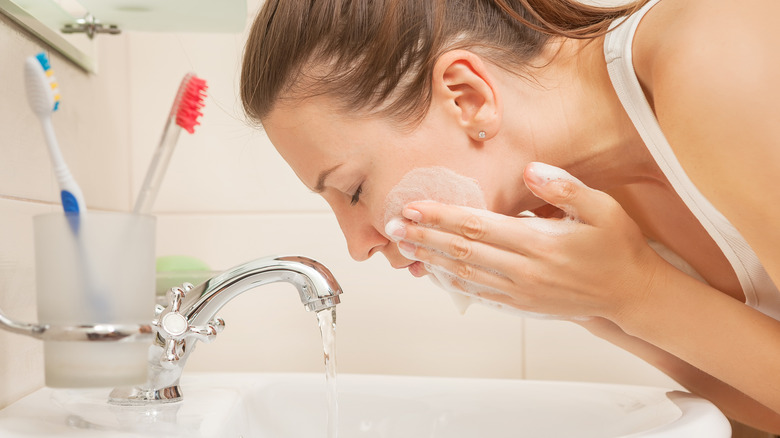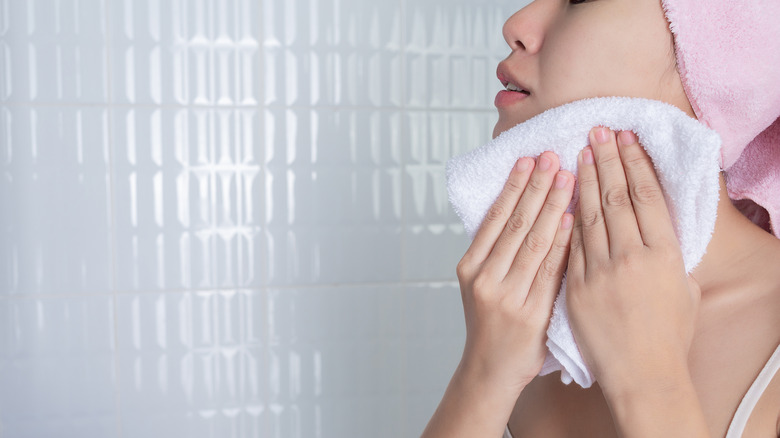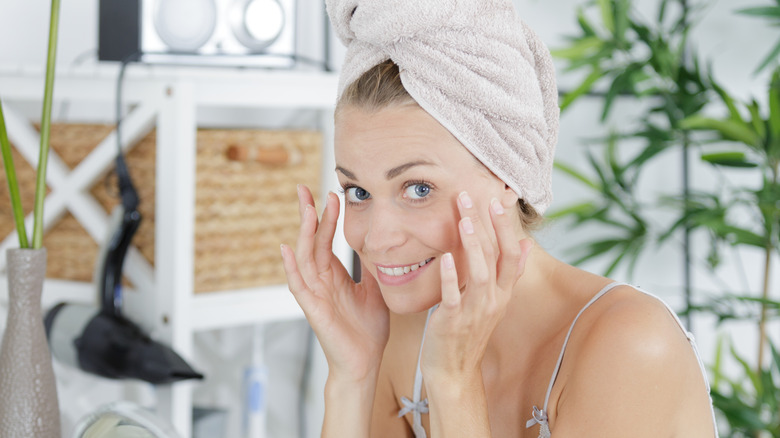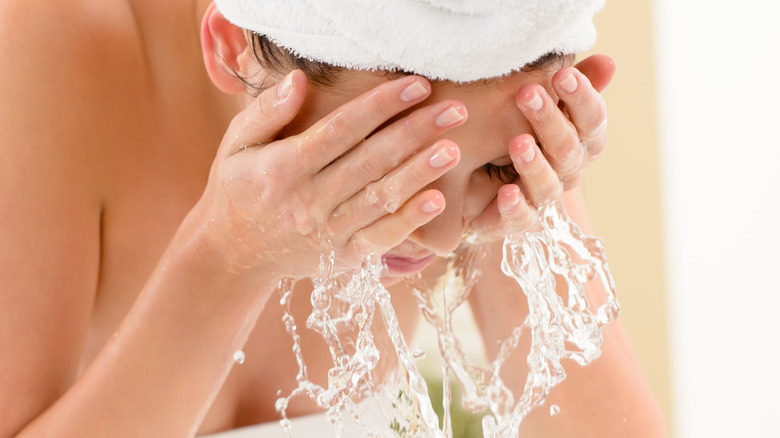This Is What Happens When You Stop Washing Your Face
Between work, household chores, and family obligations, we may not have the time to indulge in trendy 12-step beauty routines. There may even be times we don't have the energy to do more than give our faces a splash of water. And while dermatologists seem to be alright with your making do with that splash of water before bedtime or after you get up, skip any kind of washing altogether, and Allure warns that you could end up in some trouble.
"What happens when you stop washing your face depends a lot on the condition of your skin — oily, dry, combination — and what types of things you usually put on and get on your face," New York dermatologist Soren White says. Regardless of your skin type, giving your face a good clean every day is especially important for folks who live in the city, because urban dwellers are regularly exposed to tiny particles like dust, chemicals, and pollutants... all day. "[It's] important, at least at the end of the day, to actually do something to cleanse the face," Dr. Arielle Nagler, an assistant professor of dermatology at NYU says (via The Cut).
Skipping makeup doesn't mean you can skip washing your face
Dermatologists are happy for your to simplify your cleansing and toning routine, but they are not keen on the idea of you giving any form of cleansing a hard pass. "Cleansing your face removes makeup, oil, dirt, and other debris. Even if you don't wear makeup, the skin on your face comes into contact with residue from other skin-care products like moisturizer and sunscreen, as well as pollutants, microbes, dirt, and other debris, not to mention oils, sweat, and dead skin cells," explains New York dermatologist Sejal Shah.
But how does not washing your face really affect it? If you have oily skin and you stop washing your face, your skin is likely to get more oily, and you can expect to see more breakouts. If your skin is dry, skipping the face wash will cause your skin to look even duller. But wait, there's more. Remember all the buildup from skin-care products and pollutants on an unwashed face that we were talking about? "This buildup can potentially clog the pores resulting in dry, irritated skin, and even acne. This can lead skin to becoming itchy, resulting in scratching, potentially leading to breaks in the skin, which can then increase the risk of infection," Shah says.
It is possible to overdo it when it comes to washing our faces
But just as we need to clean our face regularly to keep our skin in tip-top condition, we also need to know when we've gone over the top with our skin care routines. Dermatologists are especially wary about products with ingredients full of chemicals. "I'm of less-is-more when it comes to face-wash camp... People like [certain types of face wash] because they feel clean afterward, but they also promote inflammation, which can lead, downstream, to negative effects, including acne," dermatologist Arielle Nagler said. She has a preference for using cleansers with no parabens, fragrances, or formaldehyde, and recommends you use lukewarm water to splash your face with, because hot water can dry your skin out, too.
Soren White explains, "On the flip side of regularly cleansing, washing with soap or even a gentle cleanser is not always necessary. Over-washing is one of the major causes of dry, irritated skin, especially during winter months. Washing your face with splashes of water may actually be good for you if your skin is dry, because water cleans your skin without stripping it of the oils it needs to stay hydrated and irritation-free."
The right way to wash your face
There is a right way and a wrong way to wash because, as dermatologist Joshua Zeichner, explained to Byrdie, "The wrong cleanser can rub your skin barrier, leading to inflammation (or it may not do an effective enough job). Remember, the right cleanser for you may be very different from what your best friend is using." It's important that you find a skincare routine that works for your skin.
Dermatologist Kally Papantoniou told Prevention that there might be times when giving your face a splash with warm water is good enough, but not if you're wearing makeup or have particularly oily skin. She does endorse a low-maintenance option, though. "I think it's very logical to remove makeup and buildup of oils and bacteria in the evening [with a mild cleanser], and in the morning a gentle rinse with water should be enough to start the day," she said.
At the end of the day, there are plenty of things you should stop doing to your skin, but washing your face isn't one of them.



